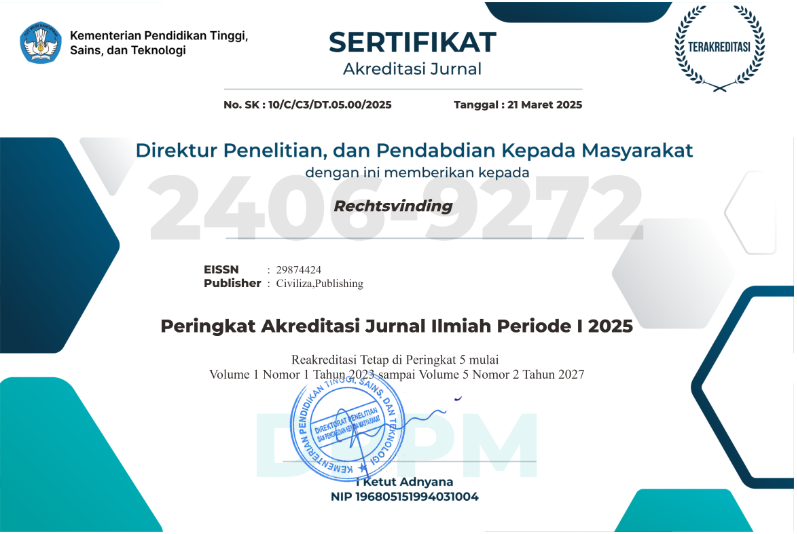Legal Protection and Certainty for Children Born Out of Wedding Through Legal Remedies Recovering the Child's Origin in the Court (Analysis of Decision Number 196/Pdt.P/2023/Pn.Cbi)
Keywords:
illegitimate children, legal protection, legal certainty, child's origin, court petition, best interests of the childAbstract
Legal protection and guarantees for illegitimate children are crucial issues in the Indonesian family law system, as their legal status often faces discrimination and uncertainty regarding the recognition of civil relationships, inheritance, and access to basic rights. This study aims to examine legal steps that can be taken to provide legal protection and guarantees for illegitimate children, particularly through the process of applying for a determination of the child's parentage in court. Using a normative juridical approach and case analysis, this study analyzes relevant legal provisions, court decisions, and the principles of human rights and the best interests of the child as stipulated in the Convention on the Rights of the Child and national regulations. The research findings reveal that although illegitimate children have historically faced a number of legal obstacles, developments in jurisprudence following Constitutional Court Decision No. 46/PUU-VIII/2010 have provided an opportunity for the recognition of civil relationships between children and their biological fathers through the process of applying for a determination of parentage in court. However, implementation in the field continues to face obstacles, both procedural and socio-cultural. Therefore, harmonization of legal norms, increased capacity of judicial officials, and extensive outreach are needed to ensure that every child, regardless of their origin, receives fair and non-discriminatory legal protection and certainty.
References
Mahkamah Agung RI. (2021). Laporan Evaluasi Pelaksanaan PERMA No. 6 Tahun 2016,. Direktorat Jenderal Badan Peradilan Umum, , 18.
Mahkamah Konstitusi Republik Indonesia, P. N.-V.–6. (n.d.).
Mahkamah Konstitusi, Putusan Nomor 46/PUU-VIII/2010, pertimbangan hukum angka 3.21. (n.d.)
Undang-Undang Republik Indonesia Nomor 1 Tahun 1974 tentang Perkawinan, Pasal 43 ayat (1). (n.d.).
Undang-Undang Republik Indonesia Nomor 16 Tahun 2011 tentang Bantuan Hukum, LN RI Tahun 2011, No. 111, Pasal 1 angka 2 (belum secara eksplisit mencakup kasus asal usul anak). (n.d.).
Undang-Undang Republik Indonesia Nomor 35 Tahun 2014 tentang Perubahan atas Undang-Undang Nomor 23 Tahun 2002 tentang Perlindungan Anak, P. 2. (n.d.).
Asriani, . (2014). Analisis Yuridis Perlindungan Hukum Kedudukan Anak Luar Kawin Dalam Hubungan Kewarisan(Bandar Lampung. Lembaga Penelitian dan Pengabdian Kepada Masyarakat , 5.
Komisi Perlindungan Anak Indonesia (KPAI). (2023). Laporan Tahunan Perlindungan Anak 2023, Jakarta: KPAI,. Laporan Tahunan Perlindungan Anak 2023, Jakarta: KPAI,, 32.
Lulzannah, A. (2023). Analisis Faktor Peningkatan Kelahiran Anak Diluar Nikah Dalam Persepsi Masyarakat (Studi Kasus Di Gampong Geudong-Geudong, Kecamatan Kota Juang, Kabupaten Bireuen) . (Doctoral dissertation, UIN Ar-Raniry Fakultas Syariah dan Hukum).
Mutmainnah, M. . (2019). Lingkungan Dan Perkembangan Anak Usia Dini Dilihat Dari Perspektif Psikologi. International Journal of Child and Gender Studies, 5(2), 15-32., 15-32.
Yeni Widowati. (2022). Hambatan Pembuktian dalam Permohonan Penetapan Asal Usul Anak di Luar Kawin. Jurnal Hukum Keluarga Progresif, Vol. 5, No. 1, 45.
Adam Ilyas, S. H. . (2024). Hukum Acara Pidana: Dari Penyelidikan hingga Eksekusi Putusan. Jakarta: PT RajaGrafindo Persada–Rajawali Pers, .
Ahmad Fathoni Ramli. . (2013). Administrasi Peradilan Agama: Pola Bindalmin dan Hukum Acara Peradilan Agama dalam praktek. Bandung: Mandar Maju.
Downloads
Published
How to Cite
Issue
Section
License
Copyright (c) 2025 Alvy Nur Salimah, Agus Satory, Mahipal Mahipal

This work is licensed under a Creative Commons Attribution 4.0 International License.








